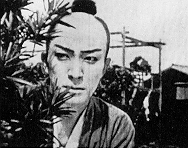HOME
![[Matsuda company logo]](../images/matsuda_base.gif)

(1924) Co-produced by Makino Film Productions and Toa Kinema Tojien Studios
Running time: 21 minutes
Original story and film adaptation: Susukita Rokuhei
Directed by: Futagawa Buntaro
Cinematography: Hashimoto Saichiro
Cast
Mikisaburo Nanjo: Bando Tsumasaburo
Genzaburo Hayami: Kataoka Kozaburo
Jupeita Kurahashi: Arashi Kanzaburo
Kurahashi's daughter Misao: Makino Teruko
Nanjo's older sister Tomi: Shimizu Reiko
Nanjo's mother: Nakagawa Yoshie
Heinai Yamamuro: Segawa Michisaburo
Mr. Kuma the carpenter: Ootani Manroku
OUTLINE
Nanjo Mikisaburo is a young samurai trying to
restore his ruined family to its past glory. Enduring the
contempt and disdain of high-ranking samurai, Mikisaburo
devotes himself to the way of the warrior, mastering the
literary and martial arts. His master Kurahashi Jupeita's
daughter Misao feels for Mikisahuro who maintains his pride in
the face of the arrogant samurai's scorn. She sympathizes
with and encourages him. However this sympathy ignites a
passionate love for her in Mikisaburo.
One day Mikisaburo's mother is walking along the road. Hayami Genzaburo, the son of a chief retainer, and his escorts are galloping on horseback. Genzaburo's horse kicks Mikisaburo's mother and she dies. Next, Mikisaburo returns home to find that his sister has been violated by Genzaburo. Finally, the object of Mikisaburo's love, Misao, becomes Genzaburo's wife.
His mother, his sister, and finally Misao. Mikisaburo's young blood boils and flows backwards.
Mikisaburo barges in on Genzaburo and Misao's wedding. Considered a madman, he is set upon by many, beaten mercilessly and banished. His sister Tomi, incapable of bearing her shame, takes her own life. Seven years pass as Mikisaburo burns with an ever increasing rage towards his old enemy Genzaburo.
Drowning in a life of alcohol and ruffianism, Mikisaburo passes his days as a fallen ronin (a masterless samurai). One day, there before his eyes appears a happily-married Genzaburo and Misao. In a flash Mikisaburo remembers everything and as the flame of his rage reignites, he draws his sword. Finally the day has come when his lamentations are to be relieved. Mikisaburo's sword doesn't stop until it reaches Genzaburo. However, there is something lonely about the smile that flows across Mikisaburo's victorious face.
COMMENTARY
The star of this film, Bando Tsuaasaburo, made his debut
in 1923 and became a popular star overnight. Until his death
in 1953 he maintained his position as one of the top
superstars of the Japanese film industry. This film was one
of the works that helped propel him to popularity, unfortunately, there are many parts that have been lost and the
present version is on only fragmentary. Until Bando Tsumasaburo
appeared, Japanese period dramas were strongly influenced by
traditional kabuki theater and their performance's merely
characterized by highly theatrical slow movements. The main
characters were invariably pure heroes and noble men.
Bando Tsuaasaburo started out as a kabuki player, but he
brought to his films a much faster, cinematic performance
style. Rather then pure and noble heroes, Bando played rebellious samurai disenchanted with the evil in society. He
received wide acclaim for his treatment of characters who
sympathized with the anti-establishmentarianism of the 1920's.
Backward Current was made at the time when he was creating
such characters and performance techniques. Script writer
Susukita Rokuhe and director Futagawa Buntaro worked with
Bando Tsumasaburo on several other films during this period
and helped him develop his film persona.
Bando Tsuaasaburo appeared in over 2OO films during his career. In the majority of them he played a strong samurai. However, in his later years he gained great recognition for his portrayal in contemporary dramas of uneducated but good-natured common men.
![[Matsuda company logo]](../images/matsuda_base.gif)